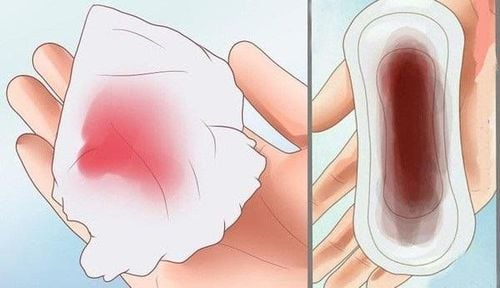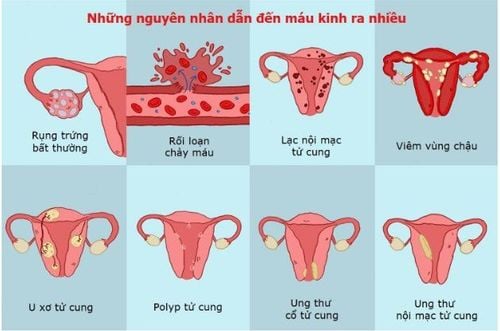This is an automatically translated article.
The article was professionally consulted by Specialist Doctor II Nguyen Thi Minh Tuyet - Head of Obstetrics and Gynecology Department, Vinmec Central Park International General Hospital.Many women sometimes come to the "red light day" when they see abnormal menstrual blood, affecting work and daily activities. So is heavy menstrual bleeding dangerous, what is the cause and how to handle it?
1. Is heavy menstrual bleeding common?
Heavy menstrual bleeding is quite common. About a third of women have to find a way to deal with this condition every time they get their period. Heavy bleeding is an unusual sign, warning of a more serious health problem. This makes life difficult and inconvenient for women. If you notice more menstrual bleeding than usual, see your obstetrician-gynecologist for an accurate diagnosis.2. How much is the menstrual cycle?
Trắc nghiệm: Sự hiểu biết của bạn về kinh nguyệt
Kinh nguyệt có vai trò quan trọng đối với sức khỏe sinh sản, do đó nữ giới cần chủ động trang bị kiến thức để theo dõi và kiểm soát tình trạng sức khỏe. Bài trắc nghiệm sau đây sẽ giúp bạn hiểu hơn về chu kỳ kinh nguyệt của bản thân.Menstrual bleeding lasts more than 7 days. Menstrual blood soaked tampons, had to change new pads in less than an hour, continuously for several hours in a row. You must use several pads at the same time to control the amount of menstrual flow. It is necessary to change the dressing during the night. Menstrual blood contains many large clots, occupying more than a quarter of the volume.

3. How does heavy menstrual bleeding affect health?
Heavy menstrual bleeding is likely a sign of an underlying health problem that requires treatment. This condition can lead to iron deficiency anemia. Severe anemia causes shortness of breath and increases the risk of heart problems.4. What causes heavy menstrual bleeding?
There are many reasons that make menstrual bleeding worse. Some possible causes include:Uterine fibroids and polyps Endometriosis Irregular ovulation days Bleeding disorders Aspirin and blood thinners can lead to menstrual bleeding more severe IUD use (IUD) Endometrial cancer Other causes: pregnancy-related (such as ectopic pregnancy and miscarriage), pelvic inflammatory...

5. Tests to diagnose heavy menstrual bleeding?
A number of tests may be done, including pregnancy tests and tests for certain sexually transmitted diseases. Based on your symptoms and age, some additional screening techniques may be needed:Pelvic ultrasound Laparoscopy Endometrial biopsy: Partial removal of endometrial tissue and look under the microscope. Uterine Irrigation Ultrasound: An ultrasound procedure that uses sterile fluid injected into the uterus through the cervix, recording images of the inside on a computer screen. Magnetic resonance imaging: A procedure that uses the strong magnetism of a magnet to create images of internal organs.
6. Medicines to treat heavy menstrual bleeding
Medication is the first line of treatment for hypermenorrheaIf the cause is ovulation problems, endometriosis, polycystic ovary syndrome, and fibroids, it can often be controlled. controlled by some hormonal drugs. These medications can reduce menstrual bleeding, make periods more regular, or even stop bleeding altogether. Hormone therapy may be helpful in treating abnormal menstrual bleeding that occurs during perimenopause. Before deciding to use hormone therapy, the benefits of treatment must be weighed against the risks of side effects (increased risk of heart attack, stroke, and cancer). GnRH (gonadotropin-releasing hormone) agonists help stop the menstrual cycle and reduce the size of fibroids. These drugs are only used for a short time (usually less than 6 months). Their inhibitory effect on fibroids is only temporary. Once you stop using the medicine, the fibroids will return to their original size. Tranexamic acid: is a prescription medication used to treat heavy menstrual bleeding. It comes in tablet form and is taken every month at the start of your menstrual cycle. Nonsteroidal anti-inflammatory drugs (NSAIDs), such as ibuprofen, are also effective in controlling heavy menstrual bleeding and reducing menstrual pain. If you have a bleeding disorder, your doctor may prescribe special medications to help clot your blood.

7. Treatment of massive menstrual bleeding with surgery
If medication doesn't solve the problem, your doctor will have to consider surgery:Uterine artery embolization (UAE): Used to treat uterine fibroids. When UAE is performed, blood vessels to the uterus are blocked, which prevents the blood supply for fibroids to grow. Hysterectomy: To remove fibroids without affecting the uterus. Hysteroscopy: ablation of fibroids under the lining of the uterus Hysterectomy: The surgery to remove the uterus completely. This surgery is used to treat fibroids and endometriosis, when other options have failed or no other option is available. Hysterectomy is also used to treat endometrial cancer. After a hysterectomy, a woman loses her ability to get pregnant and will no longer have periods. When noticing symptoms of excessive menstrual bleeding, women should not be subjective but should immediately go to a medical facility for immediate examination and treatment. Because it can be a sign of dangerous diseases, seriously affecting fertility as well as the body's general health if not treated promptly.
The basic gynecological examination and screening package at Vinmec International General Hospital can help customers detect inflammatory diseases early, making treatment easy and inexpensive; Screening and early detection of gynecological cancers even when there are no symptoms.
Please dial HOTLINE for more information or register for an appointment HERE. Download MyVinmec app to make appointments faster and to manage your bookings easily.














